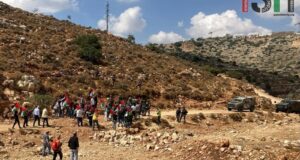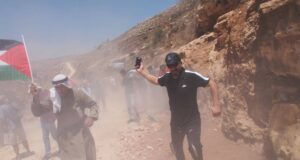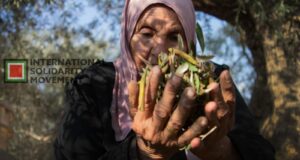Street theatre and demonstration in Deir Ballut
By Sarita
August 4
Deir Ballut villagers were joined today by 30 International and Israeli activists in a demonstration against the military check point blocking the entrance to their village. Deir Ballut, southwest of Salfit, and its neighboring villages Rafat and Zawiya, are projected to be imprisoned by the Apartheid Wall and have been living under continuous closures. Twenty-two houses are isolated from the rest of the village behind this check point. No one except for the residents of these houses are allowed access to the area, and villagers are routinely submitted to humiliating treatment when attempting to access either their homes, their lands, or the rest of the village. When completed, the Apartheid Wall will isolate and surround Deir Ballut, cutting it off ompletely not only from its fertile agricultural lands, but also from the rest of Salfit District and the surrounding towns.
Shouting “Free, Free Palestine” the demonstrators reached the blockade placed by the soldiers to stop the protest from reaching the checkpoint. The protestors erupted into a vivid theatrical displaythat mimicked the deadly reality of Israeli soldiers at checkpoints, carrying plastic water guns, wearing bowls on their heads to serve as helmets, and carrying a big sign to mark the theatrical checkpoint. Several friends from within the demonstration pretended to try to pass through their checkpoint and were refused and shot. The Israeli activists chanted, “We don’t fight, we don’t cry, we refuse to occupy.” The demonstration ended peacefully and everyone returned to the village to feast.
The people living in Deir Ballut and its neighboring villages used to rely on work inside the Green Line before the beginning of the second Intifada in 2000. But with the intensification of the Occupation policy of closure, villagers were unable to reach their workplaces inside the Green Line. This meant that most of them had to return once again to agriculture as their primary work, and they have since relied on working the land as a basic source of income.*
Today’s action is part of a series of actions organized in the Salfit district that highlights the occupation and ghettoization of the West Bank. Work on the Apartheid Wall in Deir Ballut began in June 2004. The wall confiscates hundreds of dunums of Deir Ballut’s lands while isolating 80% of the village’s agricultural lands. The settlements of Badue’l and Ale Zahav plan on building an additional 550 housing units on the village’s lands. In the western area, the Wall will ghettoize three villages in total (Deir Ballut, Zawiya, and Rafat). reating a “bantustan” isolated from surrounding villages and towns, villagers will have no connection with the outside world except through the Zawiya “tunnel”, which leads to Masha village in the north. The “tunel”, referred to as a “hole” by Palestinians, will be under control of the Occupation Forces.
They will regulate and determine Palestinian life and movement through it. When completed villagers (assuming they have passes and are allowed to access the Zawiya “tunnel”) will have to make a long journey to reach the key city of Salfit which provides essential educational, cultural, social and economic services. Villagers will be forced to detour far to Qalqiliya, then to the city of Nablus in order to reach Salfit city. What is now a short trip will soon require a full day’s travel — and that is if there are no Occupation checkpoints along the way to slow the trip down or make it simply impossible to pass.
(Statistics and background form the Stop The Wall
Campaign website: www.stopthewall.org)
 International Solidarity Movement Nonviolence. Justice. Freedom.
International Solidarity Movement Nonviolence. Justice. Freedom.




